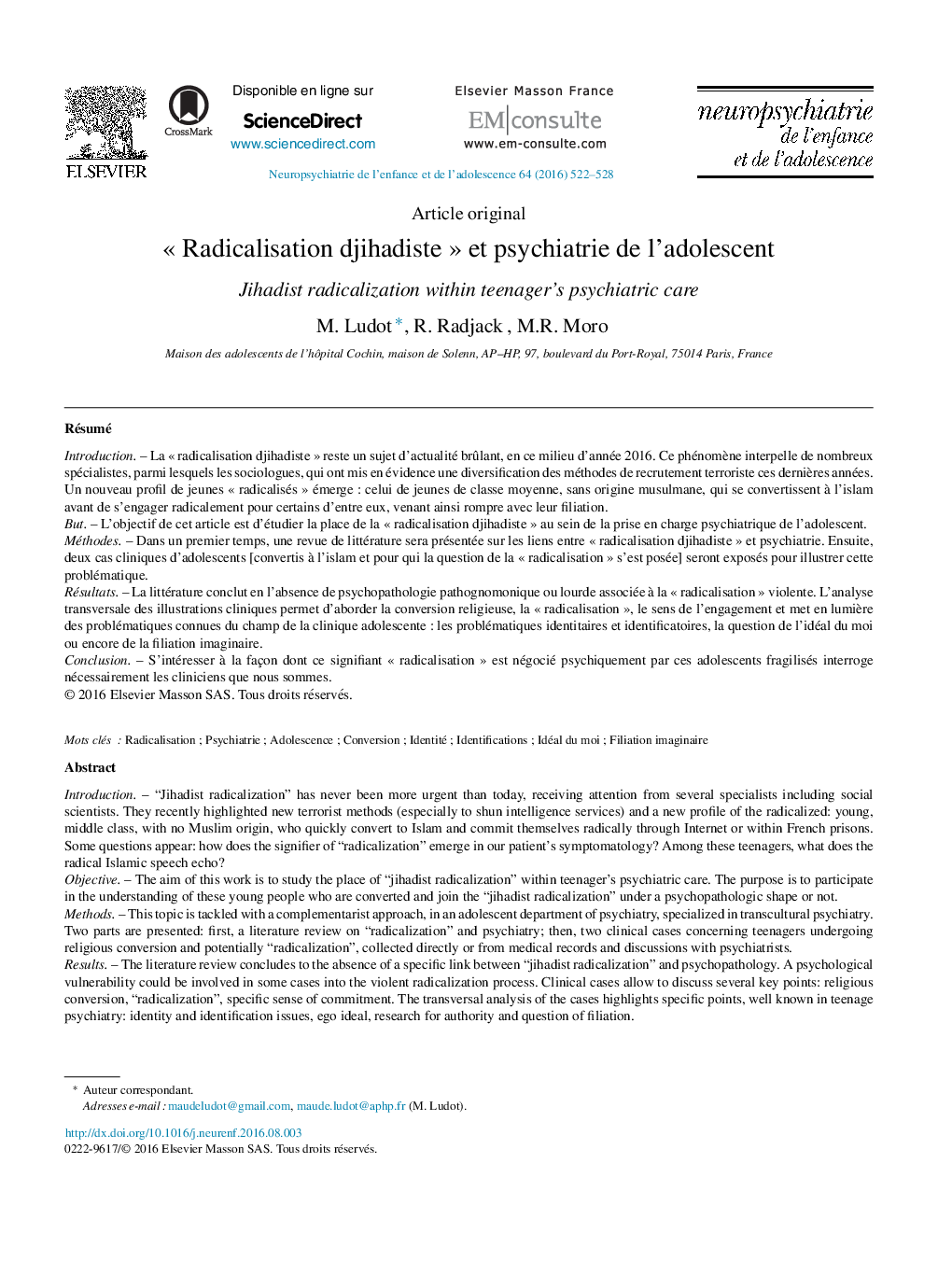| کد مقاله | کد نشریه | سال انتشار | مقاله انگلیسی | نسخه تمام متن |
|---|---|---|---|---|
| 5044917 | 1370640 | 2016 | 7 صفحه PDF | دانلود رایگان |

RésuméIntroductionLa « radicalisation djihadiste » reste un sujet d'actualité brûlant, en ce milieu d'année 2016. Ce phénomène interpelle de nombreux spécialistes, parmi lesquels les sociologues, qui ont mis en évidence une diversification des méthodes de recrutement terroriste ces dernières années. Un nouveau profil de jeunes « radicalisés » émerge : celui de jeunes de classe moyenne, sans origine musulmane, qui se convertissent à l'islam avant de s'engager radicalement pour certains d'entre eux, venant ainsi rompre avec leur filiation.ButL'objectif de cet article est d'étudier la place de la « radicalisation djihadiste » au sein de la prise en charge psychiatrique de l'adolescent.MéthodesDans un premier temps, une revue de littérature sera présentée sur les liens entre « radicalisation djihadiste » et psychiatrie. Ensuite, deux cas cliniques d'adolescents [convertis à l'islam et pour qui la question de la « radicalisation » s'est posée] seront exposés pour illustrer cette problématique.RésultatsLa littérature conclut en l'absence de psychopathologie pathognomonique ou lourde associée à la « radicalisation » violente. L'analyse transversale des illustrations cliniques permet d'aborder la conversion religieuse, la « radicalisation », le sens de l'engagement et met en lumière des problématiques connues du champ de la clinique adolescente : les problématiques identitaires et identificatoires, la question de l'idéal du moi ou encore de la filiation imaginaire.ConclusionS'intéresser à la façon dont ce signifiant « radicalisation » est négocié psychiquement par ces adolescents fragilisés interroge nécessairement les cliniciens que nous sommes.
Introduction“Jihadist radicalization” has never been more urgent than today, receiving attention from several specialists including social scientists. They recently highlighted new terrorist methods (especially to shun intelligence services) and a new profile of the radicalized: young, middle class, with no Muslim origin, who quickly convert to Islam and commit themselves radically through Internet or within French prisons. Some questions appear: how does the signifier of “radicalization” emerge in our patient's symptomatology? Among these teenagers, what does the radical Islamic speech echo?ObjectiveThe aim of this work is to study the place of “jihadist radicalization” within teenager's psychiatric care. The purpose is to participate in the understanding of these young people who are converted and join the “jihadist radicalization” under a psychopathologic shape or not.MethodsThis topic is tackled with a complementarist approach, in an adolescent department of psychiatry, specialized in transcultural psychiatry. Two parts are presented: first, a literature review on “radicalization” and psychiatry; then, two clinical cases concerning teenagers undergoing religious conversion and potentially “radicalization”, collected directly or from medical records and discussions with psychiatrists.ResultsThe literature review concludes to the absence of a specific link between “jihadist radicalization” and psychopathology. A psychological vulnerability could be involved in some cases into the violent radicalization process. Clinical cases allow to discuss several key points: religious conversion, “radicalization”, specific sense of commitment. The transversal analysis of the cases highlights specific points, well known in teenage psychiatry: identity and identification issues, ego ideal, research for authority and question of filiation.ConclusionPsychiatrists are concerned by the “radicalization” topic, which appear starkly within teenager and young adult symptomatology. Concern about how “radicalization” is psychologically negotiated by some vulnerable young people is inevitable among clinicians, even if underlying psychopathology is not necessary heavy. Psychiatrists have to deal with individual fates, to help young people giving meaning to their commitment (religious or not), to help restoring continuity into a period of discontinuity caused by pubertal reorganizations, to help him or her to access to adult's status without hindering its identity maturation. The understanding of this complex and global phenomenon has to be multidisciplinary and on the ground, with the help of anthropologists, sociologists, historians or still imams.
Journal: Neuropsychiatrie de l'Enfance et de l'Adolescence - Volume 64, Issue 8, December 2016, Pages 522-528